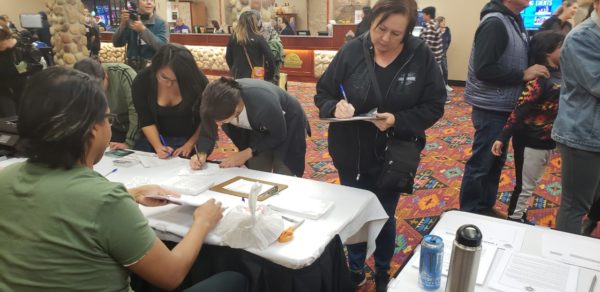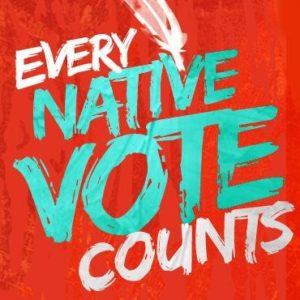
- Details
- By Levi Rickert
BISMARCK, N.D. — North Dakota Native Vote, a grass-roots advocacy organization, announced it has received a non-profit organization status from the Internal Revenue Service and discussed its goals during this election year.
The group’s genesis was the effort to help American Indians get ready to vote after voter suppression law in North Dakota went into effect just weeks before the 2018 midterm election.
The law made national headlines in 2018 when American Indians who lived in houses on reservations and in rural areas that the U.S. Postal Service (USPS) never assigned physical addresses had their voting rights challenged. Under the discriminatory law, they were required to have more than post office box numbers on their driver licenses or personal identifications when they showed up to vote.
North Dakota Native Vote was formed when a group to provide a quick response so that American Indians could overcome the obstacles by working with the USPS to get numbers assigned to homes that never had them.

Led by nine member board of directors, Native Dakota Native Vote is representative of tribal communities that seeks to build bridges across cultural gaps.
“Our organization works to engage our communities in constructing a representative democracy by working on reservations and urban areas. We strive to create and affect policy to build equal representation for the Native people of North Dakota and for the wellbeing of our communities,” Nicole Montclair-Donaghy (Hunkpapa Lakota-Standing Rock), executive director of North Dakota Native Vote, told Native News Online Tuesday evening.
“We have seen the effects of policy that's created without our input and we will work to have Native representation in the decision-making process on issues that affect our lives. North Dakota Native Vote will be a resource to help demystify that process,” Montclair-Donaghy continued.
Montclair-Donaghy says 2018 was a year eyes were turned on North Dakota because of the suppression law and it created a platform to get American Indians interested in voting and build a platform to highlight issues important to Native people.
A major goal this year, with it being a presidential election year, is to get more American Indians registered to vote, particularly those who have attained voting age, and ensure they get out to vote.
Before the 2020 election, the organization will work to get Native people to fill out the 2020 Census.
North Dakota Native Vote will work to foster sustainable positive social change in tribal communities through community organizing, mobilization, leadership development, education, civic engagement, and public policy advocacy.
After it formed in 2018, the group operated with crowd-sourced funding. Now that it has obtained its non-profit designation, the organization can now pursue funding from private foundations. The organization has decided not to accept federal or state funds.
More Stories Like This
Native News Weekly (August 25, 2024): D.C. BriefsUS Presidents in Their Own Words Concerning American Indians
Merry Christmas 2025
Navajo Man Faces Vehicular Homicide Charge After Child Killed at Navajo Nation Christmas Parade
Next on Native Bidaské: Lumbee Tribal Chairman John Lowery
Help us defend tribal sovereignty.
At Native News Online, our mission is rooted in telling the stories that strengthen sovereignty and uplift Indigenous voices — not just at year’s end, but every single day.
Because of your generosity last year, we were able to keep our reporters on the ground in tribal communities, at national gatherings and in the halls of Congress — covering the issues that matter most to Indian Country: sovereignty, culture, education, health and economic opportunity.
That support sustained us through a tough year in 2025. Now, as we look to the year ahead, we need your help right now to ensure warrior journalism remains strong — reporting that defends tribal sovereignty, amplifies Native truth, and holds power accountable.
 The stakes couldn't be higher. Your support keeps Native voices heard, Native stories told and Native sovereignty defended.
The stakes couldn't be higher. Your support keeps Native voices heard, Native stories told and Native sovereignty defended.
Stand with Warrior Journalism today.
Levi Rickert (Potawatomi), Editor & Publisher

